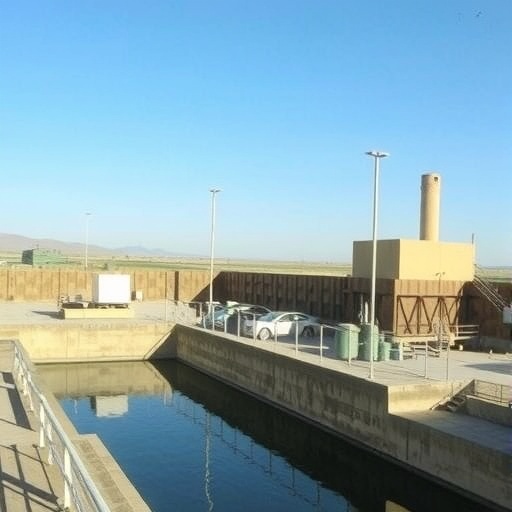In recent years, global awareness of environmental issues has intensified, compelling researchers and scientists to investigate the implications of wastewater treatment on public health and environmental sustainability. One standout study conducted by Sirat and Hammadi focuses on the complex interplay of sewage treatment plant wastewater management in El-Kerma, a community located near Oran, Algeria. The research not only sheds light on the local practices but also serves as a crucial reminder of the significance of effective wastewater treatment, particularly in regions where water sources are under stress.
Situated on the Mediterranean coast, Oran is a sprawling urban area where rapid population growth meets limited water resources. As such, the efficiency of sewage treatment plants (STPs) becomes paramount. The central question posed by Sirat and Hammadi involves the analysis and treatment of wastewater from the El-Kerma treatment facility. Their findings emphasize the importance of upgrading existing technologies to meet modern environmental standards while ensuring public health safety.
The analysis conducted by the researchers covers various parameters that characterize wastewater quality. These include biochemical oxygen demand (BOD), chemical oxygen demand (COD), total suspended solids (TSS), and pathogen presence, among others. Each of these parameters offers insight into the environmental impact of the treated effluent and its suitability for discharge or potential reuse. Understanding these metrics is crucial for determining how effectively a wastewater treatment facility can mitigate harm to aquatic ecosystems and human health.
Treatment methods held at the El-Kerma facility were scrutinized by Sirat and Hammadi, revealing a blend of traditional processes and innovative techniques. The conventional methods often struggle under the load of urban influx, leading to inefficiencies in contaminant removal. However, the researchers highlight the potential of integrating advanced treatment options, such as membrane bioreactors and advanced oxidation processes, to enhance the plant’s capacity to handle recalcitrant pollutants. These promising methods could equip the facility to better accommodate future demands while seamlessly aligning with environmental regulations.
The study also outlines how the reclaimed water, once treated, can be safely returned to water bodies or even reused for agricultural purposes. This point is particularly significant in regions suffering from scarcity where agriculture often competes with urban needs for water resources. Reclaimed water can mitigate the over-extraction of natural aquifers, fostering a more sustainable approach to both urban and agricultural water management.
An unexpected highlight of the research is the attention given to public perception regarding wastewater treatment facilities. Engaging with the local community, the researchers discovered that many residents lack awareness of the technological advancements that enhance water quality in their environment. This gap suggests not only the need for better communication strategies related to wastewater treatment practices but also an opportunity to instill a sense of responsibility among residents, promoting eco-conscious behaviors that could further support local water management initiatives.
The ecological implications of wastewater treatment extend beyond physical chemical parameters; they encompass broader ecosystem health as well. Sirat and Hammadi remind us that untreated or inadequately treated sewage can have devastating effects on local biodiversity, particularly in sensitive coastal ecosystems. Increased nutrient loads from effluents can lead to eutrophication, resulting in algal blooms that deplete oxygen levels in the water. Understanding this interconnectedness is essential for creating holistic environmental policies that prioritize both human and ecological health.
The researchers advocate for rigorous regulatory frameworks that enforce stringent oversight of STPs, demanding continual assessments of their efficacy. They argue that sustainable management of wastewater is not merely a technical challenge but also an ethical imperative. A framework that prioritizes transparency and accountability would encourage factories and municipalities to invest actively in maintaining and upgrading their treatment processes.
Furthermore, the study outlines the role of emerging technologies, such as data analytics and smart monitoring systems, in improving wastewater management. These innovations enable real-time tracking of effluent quality and operational efficiency, allowing for prompt responses to any detected anomalies. As industries and municipalities embrace the digital age, the capacity for improved environmental oversight comes within reach, leading to more sustainable practices.
Sirat and Hammadi conclude with a call to action for governments, researchers, and communities alike. They urge collaboration on both scientific and policy levels to address the multifaceted challenges presented by wastewater management. Education, investment in technology, and fostering community engagement stand out as critical components for any successful wastewater treatment strategy moving forward.
In a world where water scarcity is a growing concern, the research conducted in El-Kerma serves as a beacon for effective and sustainable wastewater management practices. By successfully combining technological innovation with community engagement and regulatory oversight, cities can pave the way for healthier environments and resilient futures. The findings from this steadfast study emphasize how the treatment of sewage can transform not just water quality, but the very fabric of community well-being.
This rich exploration of wastewater treatment practices forms just part of a larger dialogue around environmental stewardship. As these scholars illuminate, the health of our ecosystems is inextricably linked to our ability to manage and treat the waste we produce. Prioritizing sustainability in wastewater management, therefore, emerges as vital—not just for today’s generation but for the prosperity of future ones.
As we continue to grapple with the consequences of climate change and urbanization, studies like that of Sirat and Hammadi remind us that progress is indeed possible. By focusing on evidence-based strategies and fostering collaboration among all stakeholders, we can aim toward a more balanced coexistence with nature, effectively ensuring clean water for generations to come.
Subject of Research: Wastewater treatment and environmental health in El-Kerma, Oran, Algeria.
Article Title: Analysis and treatment of sewage treatment plant wastewater of El-Kerma, Oran, Algeria.
Article References:
Sirat, A., Hammadi, L. Analysis and treatment of sewage treatment plant wastewater of El-Kerma, Oran, Algeria.
Environ Monit Assess 197, 1024 (2025). https://doi.org/10.1007/s10661-025-14477-6
Image Credits: AI Generated
DOI: 10.1007/s10661-025-14477-6
Keywords: Wastewater management, sewage treatment, environmental sustainability, El-Kerma, water quality, advanced treatment technologies, community engagement.




